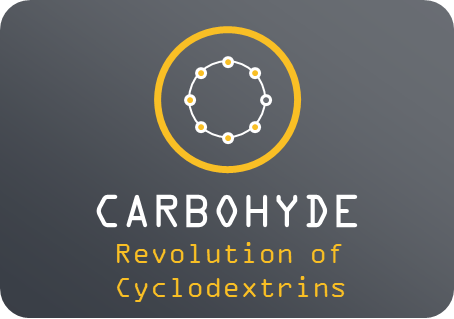GENEGUT, a research project funded by Horizon Europe, is to develop the first oral RNA-based therapy for ileal Crohn’s Disease (CD) – a chronic inflammatory disease of the intestine. The work is set to start on 1st October 2022 and last for four years. The consortium is made up of nine partners from eight European countries, who are all leading experts in their field. CarboHyde will play a crucial role by kick-starting the project by developing custom-made cyclodextrin derivatives, which will help to deliver their RNA cargo to the small intestine.
Addressing the major medical need of Crohn’s Disease
Crohn’s disease (CD), one of the two major disorders under the umbrella term of IBD (Inflammatory Bowel Disease), is a highly prevalent and high-burden chronic inflammatory condition of the gastrointestinal tract (GIT). With up to 3 million people affected in Europe alone, the chronic disease has an accelerating incidence – leading to health costs of over 5 billion euros per year. Most significantly, however, there is no satisfactory treatment.
Role of CarboHyde
The challenging task of CarboHyde will be synthesizing amphiphilic cyclodextrins, which will be used to formulate nanoparticles containing the RNA cargo. CarboHyde will synthesize a library of amphiphilic cyclodextrins, including ones with different excipients, like polyethylene glycol or lipids. Chemically different variations of these excipients will be studied to select the best-performing ones. Nanoparticle formulations with the best working amphiphilic cyclodextrins will be tested to withstand the intestinal environment in different in vivo and in vitro models.
CarboHyde hired a Ph.D. student, Kristof Felegyi, to help the project progress.
Bringing together a multidisciplinary, European network
The expertise required to achieve this ambitious aim is as diverse as the nine partners from eight European countries that will collaborate in GENEGUT.
The project, coordinated by the School of Pharmacy of University College Cork, brings together the European Federation of Crohn’s & Ulcerative Colitis Associations with renowned researchers, expert clinical scientists, SMEs, and large pharma companies with expertise and patented technologies in global proteomics, nanotechnologies, cyclodextrin synthesis, multicellular models, drug delivery systems and production as well as innovation management, stakeholder involvement, and science communication.
A library of novel biomaterials will be synthesized and used to formulate nanoparticles containing therapeutic RNA (siRNA and mRNA). A quality-by-design approach will be applied to develop the nanoparticles for filling into capsules. The resulting nanoparticles will be assessed for safety and efficacy, including the mechanism of action, in a range of advanced in vitro and in vivo models of intestinal inflammation. The clinician, with expertise in diagnosing and treating CD patients based in UCC, will support and guide the overall project ensuring clinical relevance and providing advice on coherent plans for early clinical trials and regulatory submission, thus enabling rapid availability for patients.
Follow the progress of GENEGUT at www.genegut.eu and on Twitter and LinkedIn @GENEGUT_EU to learn about the project’s steps toward a better cure for Crohn’s Disease.
Network
- University College Cork, Ireland
- Bangor University, United Kingdom
- Instituto de Investigação e Inovação em Saúde da Universidade do Porto, Portugal
- Uppsala Universitet, Sweden
- CarboHyde Zrt, Hungary www.carbohyde.com
- Janssen Pharmaceutica NV, Belgium
- Lonza Capsules & Health Ingredients – Capsugel France SAS
- European Federation of Crohn’s and Ulcerative Colitis Associations, Belgium
- accelopment Schweiz AG, Switzerland
| Facts and Figures Funding Programme: HORIZON-HLTH-2021-TOOL Budget: 5.44 million euro Duration: 01.10.2022 – 30.09.2026 Partners: 9 |
